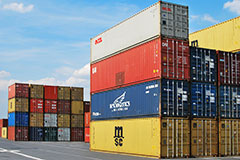Examples of Import Regulations for Cars - Vol.405
More often than not, importing a car is a complex process. You need to take into account a lot of factors, which can be confusing if you've never done it before. For that reason, we decided to give you some examples of import regulations, so you get the idea of what the process looks like. We'll show you what to pay attention to, so you can plan ahead and make sure the whole procedure goes smoothly.

Age Restrictions
Although some countries allow for cars aged up to 30 years to be imported, or don't even have restrictions, there are countries with very strict laws regarding the imported car's year of manufacture.
A good example is the Bahamas, where a vehicle needs to be less than four years old if you want to import it. Other than this, you also need a special permit if you're importing a caravan or a trailer.
Among the countries that are a bit more flexible is Kenya, which allows for cars aged up to eight years to be imported, as prescribed by The Kenya Bureau of Standards. Another good example is Samoa, where the car can be up to 12 years old.
Taxes and Duties
Another important aspect of importing a car is paying taxes and duties. Each country has its own method of tax calculation, so let's take the countries we mentioned as examples.
Bahamas
When you import a car into the Bahamas, you can expect to pay the following fees:
- Import duty - 65% of Free on Board (FOB) price
- Environmental levy - $200 fixed
- Procedure fee - 1% of FOB price
You also need to pay the Value Added Tax (VAT), which is around 7.5% of the FOB price, freight, and fees mentioned above.
Also, the Taxes imposed on importers vary according to the vehicle's value:
- Up to $10,000 - 45% duty + 7% stamp tax
- $10,000 - $20,000 - 50% duty + 7% stamp tax
- Over $20,000 - 65% duty + 7% stamp tax
Keep in mind that the custom duty can vary according to the cars' age and the engine capacity, so make sure to calculate them properly.
Kenya
Kenya uses a somewhat different tax system. The important thing to take into account is the CIF value of the car. CIF covers the cost of the car, insurance, and freight. Once you've determined the CIF value, the following duties and taxes apply:
- Import Declaration fee - 2.25% of the CIF value
- Import duty - 25% of the CIF value
- Excise duty - 20% of the import duty and CIF value combined
- VAT - 16% of the CIF value, excise duty, and import duty combined
Samoa
Samoan regulations are a bit simpler, and the taxes and duties aren't as high as those of our other examples. Here's what you need to pay:
- Customs fee - some vehicles are free of charge, but for others you would pay up to 20% of the vehicle's value
- Value added goods and services tax (VAGST) - 15% fixed
It should be said that right-hand-drive vehicles are prohibited in Samoa, so you might have to spend a bit more money on the conversion process. Also, you may have to pay an excise tax for some vehicles.
Inspections
Some countries require very strict inspections of imported vehicles. A good example is Mozambique. Pre-shipment inspection of cars is required, and it's handled by Intertek. Here's how Intertek's inspection process looks like:
1. The buyer gives Intertek the details of the purchase.
2. The buyer files a request for an inspection, and Intertek provides the details of inspection once the request is complete.
3. The car is inspected.
4. Intertek gives an opinion on the shipment's value based on the Customs Tariff Code.
5. The buyer gets an Importer Certificate and the vehicle is cleared.
For countries like Tanzania or Uganda, East Africa Automobile Service Ltd. (EAA) handles the inspection process. The procedure is similar to Intertek's and ensures that the vehicle matches the country's standard from the mechanical and structural aspects. Once the process is finished, the buyer receives a certificate of conformity and can import a car without issues.
We hope you now have a bit clearer picture of what it takes to import a car. Since this is not a simple process, make sure to consult an agent if you don't understand some of the requirements.